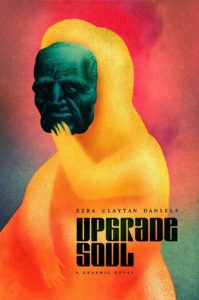We were lucky enough to have the opportunity for one of our reviewers, Lizzy Walker, to interview Ezra Claytan Daniels, the creator of the interactive graphic novel Upgrade Soul, which she just reviewed for Monster Librarian. Thanks so much, Ezra, for taking time for us! We are looking forward to seeing what comes next from you! Check out Lizzy’s review of Upgrade Soul here!
Lizzy: Tell Monster Librarian readers about yourself.
Ezra: I’m a writer and illustrator originally from Sioux City, Iowa, and currently based in Los Angeles. I worked for many years as a trial graphics consultant, creating medical and technical illustrations, and charts and graphs for high-stakes trials. I worked with the Department of Justice to help present the case against former Illinois Governor Rod Blagojevich. That job was a huge influence on my approach to comics and storytelling.
Lizzy: What inspired you to create Upgrade Soul?
Ezra: The seed for Upgrade Soul came to me in my first year of art school. I moved to Portland, OR from a small town in Iowa, where I was kind of THE art kid. Then I started college, where I was suddenly not the best at anything. All the skills and ideas that had defined my identity my whole life, where suddenly not unique to me. So that existential terror of being made obsolete by someone who is better at being me that I was, is what eventually became Upgrade Soul.
Lizzy: What do you want readers to take away from your story?
Ezra: I wanted to challenge people’s ideas not only of what is normal, but what is good or bad, or better or worse. The central conflict in the book involves a person being faced with a clone that is smarter, stronger, and healthier than they are, but is severely disfigured. So the drama is, which version is better? The one that looks like the person we recognize, or that one that’s better in every measurable way, but because of the way they look, won’t be able to move through the world with the same ease? It’s this horror that our lives are governed and restricted by these arbitrary preferences for certain types of bodies, abilities, genders, or skin colors.
Lizzy: One of my favourite sections in the book is when Molly’s bandages are being taken off. The perspective shift is so well done, and the emotional reaction Molly has to her new body is so strong. What is your writing process like to be able to evoke so much emotion in your story?
Ezra: That specific sequence is an homage to a classic sci-fi trope. I think it first entered the lexicon with the “Eye of the Beholder” Twilight Zone episode, but you also see it in Robocop, and Tim Burton’s Batman, and I even just spotted it in that Tarsem Singh movie, Self/Less. But to answer your question, I love working within strict limitations. One of the main challenges I set for myself with this book was that I wanted to try to write a soap opera. I’m not a fan of soap operas, so the challenge was to write a soap opera that I would really love. So from day one, the main spine of Upgrade Soul was really big dramatic moments and heightened emotions.
Lizzy: What was the hardest part about writing Upgrade Soul?
Ezra: Writing Lina was by far the hardest part. She’s a character who was born with a severe disfigurement, which is not my experience. It took a lot of research, interviews, and introspection to write her in a way I felt comfortable with, but it’s still by far the part I’m most self-conscious about.
Lizzy: I have had the chance to explore the first chapter in the new app. It’s fantastic! Can you talk about the creation of the associated app?
Ezra: The comic was actually originally designed for the app—that’s partly why the panel structure is so rigid and cinematic. But the whole idea with the app is to try to create a more immersive comics reading experience. The developer, Erick Loyer and I spent many, many hours working out how far we could use technology to push a comic before it stopped feeling like a comic. The main rule we established (you can see our whole philosophy at https://screendiver.com/digital-comics-manifesto/) was to never take control of time from the reader. The main immersive feature of our app is the original score, composed by Alexis Gideon. The score is reactive, so it keeps perfect pace with your progress through the story—you’re really controlling the pace of the music in the same way that you control the pace of the story. Every panel transition triggers a change in the music, so every emotional beat in the story is perfectly accompanied by the score, no matter how fast or slow you read.
Lizzy: Why should libraries be interested in this title?
Ezra: It’s an extremely dense book, loaded with references, homages, and entry points to other works. I worked on it off and on for 15 years, and every time I went back to it, I would add more layers from my life experience and current interests. I namedrop authors like Octavia Butler and Samuel Delany; I reference the history of pulp science fiction; I touch on concepts of experimental neurology and genetics; there’re primers for debates about transhumanism and eugenics. I see this book as a gateway to all sorts of other books and fields.
Lizzy: What else would you like librarians to know about your work?
I think about my high school self a lot. I’m constantly judging my progress and accomplishments through the lens of, “would 17 year old Ezra be proud?” I see my 17 year old self as my primary audience. I was a precocious kid who dressed weird, loved weird movies, and didn’t have a lot of friends. If any librarians know a kid who fits this description, I would love nothing more than to get my books into their hands.
Lizzy: What are you working on currently?
Ezra: I’m working on some non-comics stuff in the Upgrade Soul world. I have a new non-fiction zone that will be available at www.radiatorcomics.com in the first week of November, called “Are You at Risk for Empathy Myopia?”
Interview by Lizzy Walker






Graphic Novel Review: Upgrade Soul by Ezra Claytan Daniels – Musings of the Monster Librarian
November 16, 2019 at 1:38 pm